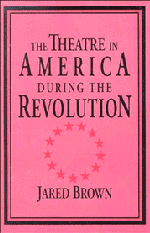Prologue
Published online by Cambridge University Press: 29 September 2009
Summary
Chroniclers of the relationship between colonial Americans and the theatre have long tended to see a conflict of rather simple dimensions: “Morality” and devotion to religion on one side versus those who wished to enjoy the pleasures the theatre could offer on the other. The truth is more complex. Many colonial Americans of the eighteenth century opposed the fledgling professional theatre (dominated by the British) on the ground that it competed with and detracted from the development of American mercantile enterprises. Whatever money was spent by the theatre's patrons could not be spent to purchase American goods and services, after all. As Peter A. Davis has pointed out, “In this way, theatre became much more than just an undesirable amusement; it was a political and social symbol of English oppression.”
At the same time, the moral and religious opposition to the theatre cannot be overlooked, for some Americans firmly believed that the theatre was a place of evil whose function was to teach blasphemy, lechery, and sedition. Chief among these were Puritans, who, although a minority among the immigrants, were highly influential in several northern colonies.
Although it is misleading to make sweeping generalizations about “Puritan attitudes,” scholarly observers agree that the Puritans did share a decided aversion to the theatre.
- Type
- Chapter
- Information
- The Theatre in America during the Revolution , pp. 1 - 8Publisher: Cambridge University PressPrint publication year: 1995

